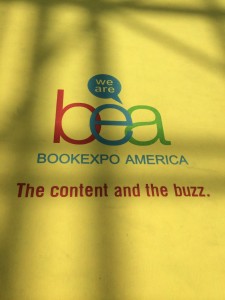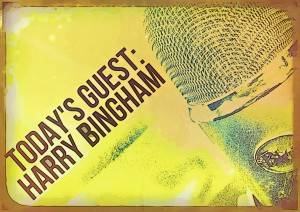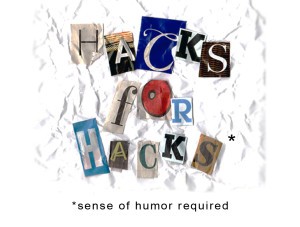Publicity
The publishing world was a curious mix of hyperactivity and near-total silence last week, which can mean only one thing: Book Expo America, known as BEA. It’s an absolutely immense industry-only tradeshow and the largest publishing event in the U.S. by far, with roughly 20,000 publishing industry professionals in attendance.
If you didn’t go, you might feel left out. But never fear! Here’s everything you would have learned if you’d gone.
If you’re an aspiring author, there’s pretty much no reason to go. Here I can’t say it any better than power agent and tell-it-like-it-is internet presence Janet Reid in a recent post on her blog:
BEA is NOT a place for writers to meet agents or try to get info on getting published. Yes, I’ll be there. So will everyone from my office. I’m not there to meet you. I’m there to see what publishers are doing. I’m there to meet with my co-agents from far flung lands. I’m there to get a sense of the sea changes in the industry… You want to go to WRITER’S CONFERENCES, not trade shows. Go where agents ARE actively looking to talk to you.
Boom! Aren’t you glad you didn’t go? Cross it off your list.
Read MoreWarning: Hacks for Hacks tips may have harmful side effects on your writing career, and should not be used by minors, adults, writers, poets, scribes, scriveners, journalists, or anybody.
They say book tours don’t sell books. In fact, they can actually cost authors a lot of money. So why bother? Well, you’re making connections with readers and building your brand and a bunch of other slick-sounding, unquantifiable marketing-speak. If you want to be a big-shot author, you need to act the part, and that means taking your show on the road. Think of a book tour as a tax-write-off-able vacation where people tell you how awesome you are every night. Plus, you have a few days away from your family and those brats of yours, so you can hear yourself think for once. For that kind of payoff, you can’t afford not to go. Here’s everything you need to know to book your own book tour.
Six Months Prior to Tour
Five Months Prior to Tour
[pullquote]Sure, library patrons love books. What they don’t love is paying for books. You’re far too busy for those moochers.[/pullquote]
How’s this for a story:
For the past 18 months, Chris’s ex has forbidden her to see their young daughter. Not because Chris has harmed her daughter, violated any agreements or broken the law, but — as Chris sees it — because she recently completed her transition from male to female. Chris is transgender.
Since she began her transition 5 years ago, her entire family has shunned her. She’s been disinvited to Christmas, to birthday celebrations and other activities. Members of her family have verbally abused her, calling her grotesque, sick, deranged and psychotic. “If you were a real man you would have just killed yourself,” they told her.
Devastated by the lack of support from her once close-knit clan at a time of intense vulnerability, Chris did, in fact, once try to take her own life.
Today, as she struggles to regain her footing in the world, she is fighting a costly uphill court battle over her parental rights, mired in discrimination.
This may sound like rich fodder for a page-turning novel. But Chris is not a fictitious character. She’s my client. And it’s been years since I put fiction-writing aside to focus instead on bringing real-life dramas and narratives to the world not in books, but on the pages, screens and air waves of the media.
Chris has hired me to promote her children’s book, My First Red Sox Game. Stripped of all other means to communicate with her daughter, she wrote it in hopes her daughter will read it one day. It’s inspired by memories the two once shared.
Like with any other book, the backstory to My First Red Sox Game extends far beyond the plot into Chris’s personal life: her past, her pain, her dreams. To find and connect with its audiences, I need to dig into that backstory and
Read MoreI don’t tell my ‘academic’ colleagues that I write fiction. I don’t talk much about my non-fiction writing to my fiction-writing community. I LOVE e-readers because they don’t reveal whether I’m reading a steamy romance, popular history, angst-ridden literary novel, nineteenth-century article on hospitals, or an idiot’s guide to something technical that even my nine-year-old already knows how to do.
Why do I do this? Why hide my reading and writing habits? Am I ashamed of something? Scared? Yes, of course. But of what?
In switching between genres I’m scared of crossing social boundaries—of entering unknown, perhaps even unfriendly, territory; of not knowing the rules of acceptable behavior; of feeling like an outsider; of being judged, teased, criticized, left out . . . wait, this is starting to sound like conversations I’ve been having with my daughter about playground interactions.
So, does this mean genres are the literary equivalent of cliques? Hmmm. Bear with me for a little while on this.
First off, I’m not saying cliques (or genres) are good or bad in and of themselves. They exist. I’m also not interested in examining the varying characteristics of different literary genres. I do want to examine how we use them, what we potentially get from them, and what we lose by them.
Read MoreWarning: Hacks for Hacks tips may have harmful side effects on your writing career, and should not be used by minors, adults, writers, poets, scribes, scriveners, journalists, or anybody.
Let’s talk literary awards. Specifically, your tragic lack thereof. It happens. Vonnegut never won a Nebula. Nabokov got snubbed so many times he had to create the PEN/Nabokov Award so he wouldn’t feel like a failure. If these greats can’t win, what hope do you have? Wait, that came out wrong. I meant to say, here’s how you can succeed where they failed. I’ll guide you through the complete awards process, from campaigning your way onto the ballot to gauging how lit up you can get at the awards show after-party.
Step 1: Getting on the Ballot
[pullquote]Your next move, obviously, is to look at all your peers who didn’t make it onto the ballot and indulge in what the Germans call schadenfreude (pronounced SHAY-den-frood).[/pullquote]
You’ve got some award-eligible work, but you don’t want to look like a greedy, self-promoting shill. I get that. Let’s start by looking at some classy ways to get your name out there.
First, write a thing on your blog listing what you have eligible. For instance:
My name is Joe Schmo, and my short story, “The Nine Dead Grandmothers of Vincent LeRoy,” is eligible for—and fated to win—the Super Fancy Award for Best Short Story. Please send my prize to [insert PO Box number]. If shipping costs are prohibitive, I will accept the cash value of the award statuette.
Some writers like John Scalzi and Charlie Stross have dedicated spaces for listing your award-eligible work. Remember, the writing community likes to help its own, so go ahead and do this at every writing website you can find. If they don’t have a thread specifically set up for this, simply use whichever of their posts has the highest Google search rank.
Back to your own blog, you can generate good will by magnanimously highlighting other people’s work. Don’t be afraid to go outside the mainstream, either. If you’re looking for names, here’s one: me, Bill Ferris, the guy who went to all this trouble to write this helpful article. Stop making that face, it’s a swell idea. Advocate for some new, edgy authors, too. People will think you’ve got your finger on the pulse of innovative lit, and you’ll be doing yourself a favor by talking up a bunch of patsies who stand no chance of finishing ahead of you.
Read MoreToday’s guest is Greer Macallister, a poet, short story writer, playwright, and novelist whose work has appeared in publications like The North American Review, The Missouri Review, and The Messenger. Her plays have been performed at American University, where she earned her MFA in Creative Writing.
Her debut novel, The Magician’s Lie–released TODAY–has been getting tremendous buzz. It was selected as a monthly or weekly pick by Indie Next, Library Reads, She Reads, Midwest Connections, Publishers Weekly, and People magazine.
Raised in the Midwest, Greer now lives with her family on the East Coast.
You can connect with Greer on Facebook and Twitter.
[pullquote]“Smart and intricately plotted… a richly imagined thriller.” People Magazine on The Magician’s Lie [/pullquote]
The Art of the Comp
Many authors resist having their books compared to others. Most of us are striving for originality, to write a book that no one else has written or could write. But there’s an art to coming up with the right comparison (“comp” for short) that can pique the interest of readers. And comparisons in publishing are inevitable; why not be the first out of the gate with the right one?
My book, The Magician’s Lie (out today!) is about a famous female illusionist in 1905 who comes under suspicion for murder. So yes, it’s probably the only book that fits that description, and for readers who are particularly passionate about that time period, or magicians, or murder mysteries, that pitch might be enough.
But if I’ve only got a few moments to tell someone about the book – or if there’s only room in print or online for a single sentence – I might be better off using this comp: it’s The Night Circus meets Water for Elephants. There’s good reason to think that readers who enjoyed one or both of those comp titles would enjoy The Magician’s Lie as well.
(It doesn’t hurt that both were bestsellers. The Magician’s Lie could just as accurately be described as Alias Grace meets Carter Beats the Devil, but the number of people who’ve read both of those books is probably in the thousands, not the millions. You could also throw The Usual Suspects into the mix, but books are better comps than movies.)
There are dangers, of course. You never know how readers might feel about a particular title. My Goodreads reviews often cite one or both of the comp titles, but in very different ways. A few direct quotes:
Read MoreOnce upon a time, there was vanity publishing.
Remember? Those were the days when self-publishing had a very bad rap.
Not so much because the books’ quality was shaky (though that tended to be true), nor even because authors had to pay to have them published (though that was indeed frowned upon), but mainly because of the way the firms offering self-publishing services operated.
These firms cut a very nice profit offering everything from proofing to interior and cover design and could earn even more by proposing pricey add-ons, like copy-editing and developmental editing. Some would even encourage authors to buy into these add-ons by telling them their books had qualified to be nominated for an award but would only be eligible to win if they purchased these extra services. This was — and still is — considered particularly slimy and underhanded. All the more so since many authors, vulnerable in their eagerness for recognition after years of rejection, readily opted in.
Now that self-publishing has been officially de-stigmatized and it’s becoming increasingly acceptable for authors to pay for their books’ production, cottage industries are cropping up around the needs this has created: editing, page and cover design, eReader formatting, distribution to brick-and-mortar shops, marketing, promotion and more.
On one hand, this opens up a whole new world of freedom and opportunity for both authors and publishing-world entrepreneurs. On the other hand, it has given way to a shady side worthy of old stigmas that all authors should be aware of.
On this shady side, service providers don’t just offer add-ons, but either require them or make it very difficult for authors to turn them down. For example, a
Read MoreLately, a new mantra has caught on: “There’s no better time to be a writer.” Not only has self-publishing helped open the doors to so many aspiring authors, but the online world has created more opportunities than ever before to build a platform, network and self-promote.
From a schmoozing and promotion perspective, anything seems possible. We can have conversations with Jodi Picoult on Twitter, send Facebook messages to Paulo Coehlo and mingle with top agents and editors right here on Writer Unboxed.
All of which is wonderfully democratic and very much in the spirit of the camaraderie and connectedness that defines our times. But it has also created a whole new realm for potential missteps and frustration.
Along with the sense that anything’s possible has come – for lack of a better term – a sense of entitlement. With the perceived level playing field the digital age has created, the notion that having written and published a book, any book, means we’re eligible to be considered by any and all gatekeepers to widespread recognition, from Oprah to the The New York Times.
Although we long for this to be true, and perhaps it should be, it simply isn’t. Take a look, for example, at this painfully eye-opening article by Washington Post book reviewer Ron Charles called, “No, I Do Not Want to Read Your Self-Published Book.” (Ouch!)
What is true, at least for the most part, is that while most books sent in to the venerable gatekeepers of recognition will indeed wind up in the shredder
Read MoreLet’s say your book is coming out in several months, and you fall into the camp of those who want to put some time and resources into promoting it. Knowing that that your publisher can’t commit to much more on the publicity side than mailing out galleys to a standard media list, you’ve decided to give it your all, to go ahead and hire an outside publicist.
But as you research firms and see the 5-figure price tags for most campaigns, a lump forms in your throat. Your advance was modest. You know you can’t begin to estimate how much, if anything, your book will generate in sales. At the same time, you’re learning that the gist of what a publicist does is build press lists, write elevator pitches, send emails, make phone calls, mail galleys and coordinate interviews when opportunities arise. All of which seems pretty straightforward. You figure that if you had the time and the nerves, you could probably handle much of this yourself.
What’s more, the publicists you’ve interviewed have been honest, explaining that there’s no guarantee about the number of media appearances you’ll get or where they will be. NPR? The Today Show? Highly unlikely, but it’s always worth a try.
Why, then, does the average monthly retainer for a respected PR firm run between $3,000 – $7,000 with a minimum commitment of 2 – 3 months (according to this Writers’ Writer’s Digest article by Mari Passananti, who has done her research meticulously)? And — especially given that nobody can predict the connection between publicity and sales — what exactly are you getting for this price?
First, quite simply, you’re buying his or her expertise. Sure, you could subscribe to a service like Muckrack and download lists of reporters. You could sign up for HARO and SourceBottle and respond to requests if any good matches come up. But how do you know whom, exactly, to contact on a given list, what to say to them, when or how? Chances are you don’t. But your publicist does, and has many years of experience working with the press along with a solid understanding of the nuances involved: How to get reporters’ attention amid the hundreds of requests they get each day. How to talk to them. How to interpret what they say. What reporters want and need, how this differs from one publication or outlet to the next and what makes a pitch into something a reporter can actually use.
Second, you’re buying sweat equity. Lots of it.
Read MoreWe’re thrilled to have Joanna Penn back with us today. She’s an author, speaker, and entrepreneur, and was voted one of the Guardian UK Top 100 creative professionals 2013. Her latest book, Business for Authors: How to be an Author Entrepreneur, is out now in ebook, print and audio. Joanna’s website, The CreativePenn.com, is regularly voted one of the top sites for authors and self-publishers. Writing as J.F.Penn, Joanna is also a New York Times and USA Today bestselling thriller author.
Follow Joanna on her blog, on Facebook, and on Twitter!
Take Charge of Your Author Business: 5 Aspects to Consider
Writing for the love of it or to create something beautiful on the page is absolutely fantastic. But if you want your writing to pay the bills, you need to start thinking of it as a business. You need to think of yourself as an entrepreneur. Here are some definitions to begin with:
A writer is someone who writes.
An author is someone who writes a book, however that is defined these days.
An entrepreneur creates value from ideas.
So, an author-entrepreneur takes each book much further, exploiting the multiple opportunities and value in one manuscript and creating a viable business from the ideas in their head. (How cool is that?)
If you want to take the next step into being an author-entrepreneur, here are five things to consider:
(1) Reframe all parts of your business as creative
“I just want to write. I don’t want to do all the other stuff.”
These words are a constant refrain at writing events, but they can never be the reality of the author’s world anymore. Perhaps they never were. However you publish, you have to pay attention to marketing, and you have to connect with readers. You should certainly care about how your books are distributed and how the finances work.
Business is perhaps the ultimate creativity. You are potentially creating something huge in the world from nothing more than the human mind. Wow! So if you want to be an author-entrepreneur running a viable business, then it will help to reframe all aspects as creative.
Business as an author is about writing, of course, but it’s also production and distribution, customer service, sales and marketing, technology, financial accounting, strategy, and planning. If you think of those things as negative, then you will never be a happy or successful author-entrepreneur. You can hire experts to help you, but you need to understand how the business as a whole hangs together. If you love creating and you love to learn, then reframing your business activities as creative will transform the way you work!
Read More











